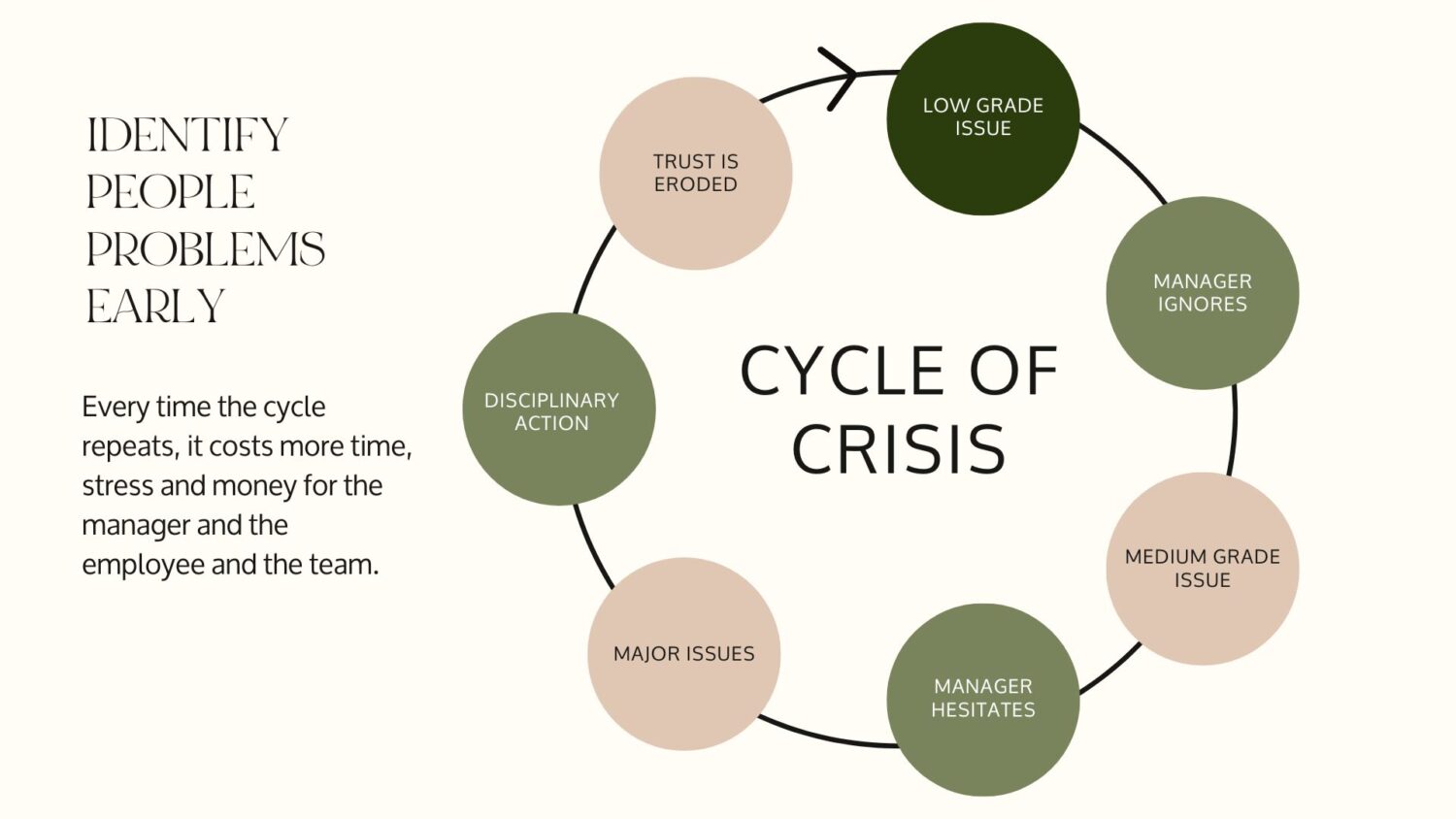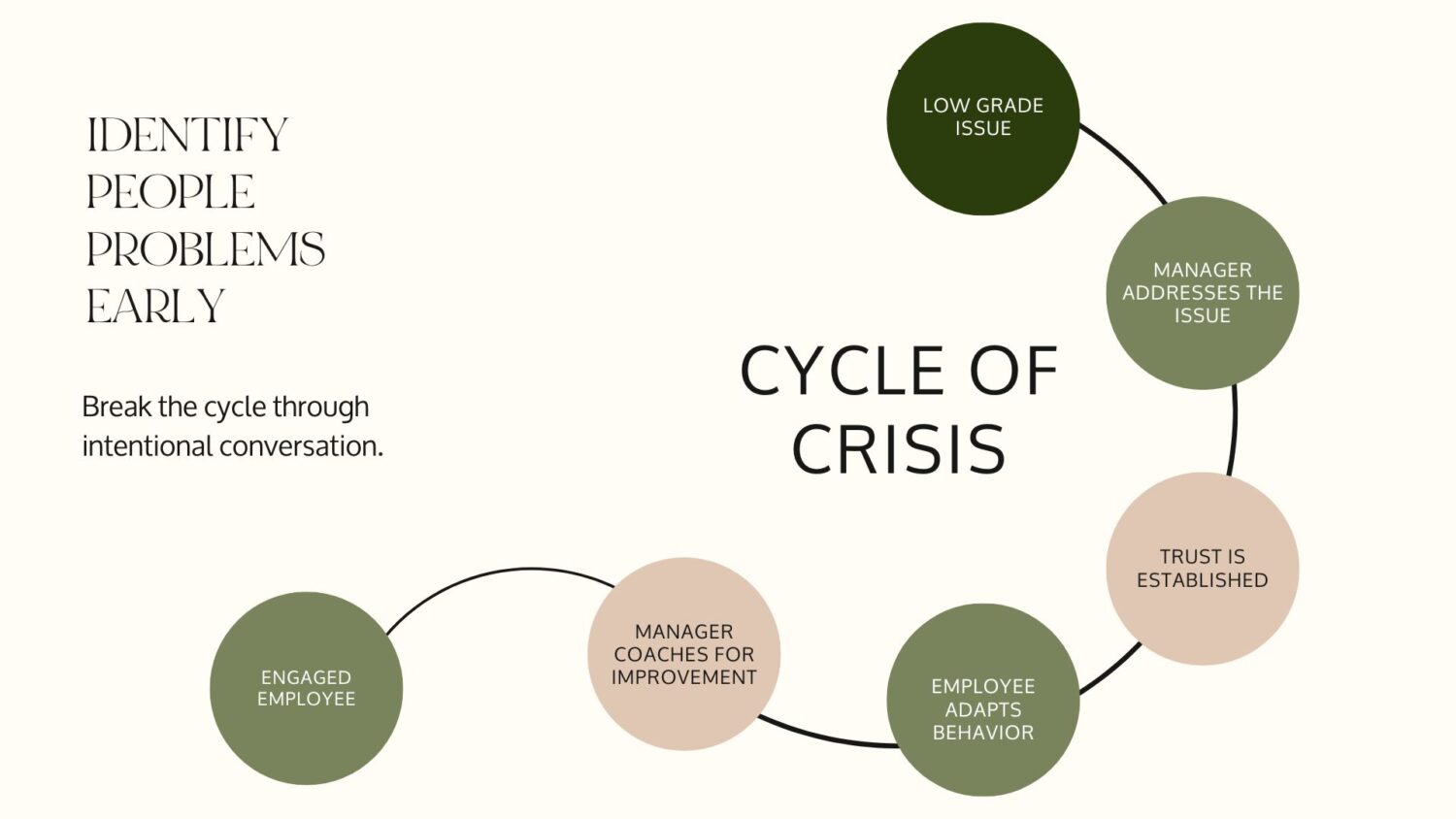June 14, 2023
Let’s talk cycles! No, ladies, not that one… I’m referring to the cycle in your business that you can’t seem to escape, the one that brings a toxic and cliquey environment to your workplace– totally on accident. I call it the Cycle of Crisis, and breaking free from it is absolutely crucial to building a positive culture in your company.
The Cycle of Crisis is a concept we came up with when trying to name the phenomenon that happens when a team member is struggling. We talk a lot about how it is usually the manager’s fault, but it’s a little rude to blame all our hardworking managers without helping them understand why this is an issue, right?
The Cycle of Crisis isn’t a result of “bad management”… it’s actually triggered by something much more common – a lack of management.
The Cycle

The Cycle of Crisis typically starts with a low-grade issue. For example, an employee may arrive a few minutes late for work or make some typos in an email broadcast. Initially, it may not seem like a big deal. As a manager, you may think it’s alright to let it slide because you have bigger fish to fry 🐠, and it’s okay for employees to make mistakes.
A few days pass, and then a medium-grade issue arises. The same employee is even later than before, or there are even more typos in this week’s email broadcast. You hesitate. You don’t want to have that tough conversation about how this can’t keep happening. Let’s face it, those conversations can be aWkWaRd. So, maybe you give them a look or make a small comment that is laughed off.
Next, a major issue emerges. The employee doesn’t show up to work at all or fails to send out any emails for the week. Now, you have no choice but to take action—disciplinary action. The employee is caught off guard, they can’t believe that you would resort to such measures so quickly.
The Crisis
Only, it wasn’t quickly for you. Let’s back up a little and take a look at a few things have happened because you were trying to avoid tackling that tough conversation.
⚠️ The employee does not feel the action fits the crime because there was no warning
🚫 You are seen as an unpredictable leader because there was no consistent accountability for the actions
☢️ The work environment starts to become toxic and that work positive work culture you have worked so hard for is now compromised
⚠️🚫☢️ BUT OVERALL trust is eroded between you and your employee
Break the Cycle
Do not worry; you can turn things around. But listen to me closely: you have to have that tough conversation. When you talk to your employee directly about the issues, you prevent further problems from arising. Even if it happens again, the actions you take won’t leave your employee feeling blindsided or othered.
Having that tough conversation makes your employee feel important and valued. They realize that their work matters because you noticed and took the time out of your day to sit down and address the issue with them. Taking the time to assign accountability will also give you the opportunity to receive feedback from your employee. Is there a valid reason why these issues are happening? Is there an opportunity for you to coach them towards greater success?
Here is a visual for you:

By following these steps you can break the Cycle of Crisis:
- Detect even the smallest of issues. This will establish the trust and a pattern within your team.
- Acknowledge the issue. Your team can adapt their behavior, and this gives the manager a chance to help coach any employees who may need it.
- Assign accountability to yourself and the employee that need it. Accountability helps prevent mistakes and strengthens your management by putting issues in the past.
- Tackle the issue earlier even the littlest issue! Do not let them slip through, but also do not be a 🐝. Mistakes happen!
When you follow these steps, you establish a pattern and trust within your team. Patterns help your team know what to expect, and if something is wrong or off course, it will be noticed. Trust allows your employees to come to you with issues and understand that disciplinary action is taken when the process has been failed by them.
While you may not be able to apply this to every employee (as we all know there are different types of employees), there are steps you can take to break out of this cycle.
I am in the cycle now. Help!
If you find yourself already caught in this cycle, don’t worry! You can break free from it. It’s important to go back and address the issues that were previously overlooked. I know that this can be challenging, especially when trust is not apart of your foundation with the employee. However, it’s crucial to go back, set that foundation of trust, and then build upon it.
Take the time to have those necessary conversations, provide clear expectations, and offer support and guidance where needed. By addressing the past issues and creating a strong foundation of trust, you can pave the way for a healthier and more productive work environment. Remember, it’s never too late to turn things around and break the Cycle of Crisis!
Listen Now!
Links Mentioned
Free Takling Tough Conversations Workshop

